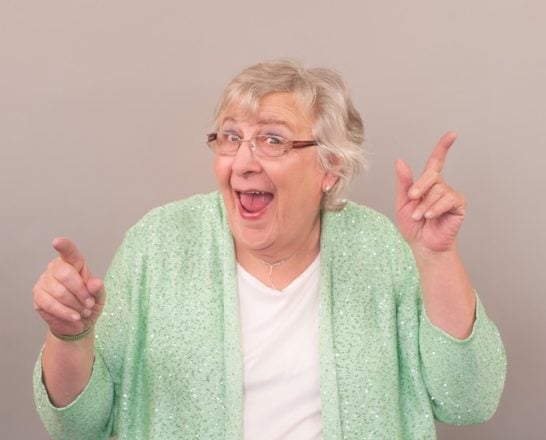WHITING, NEW JERSEY –- As comedienne Julia Scotti walked out in front of the audience at Pasadena’s historic Civic Auditorium, she knew more than comedy was on stage — It was a historic moment.
Scotti, 63, was having the most important audition of her career.
FIRST TRANS CONTESTANT
Scotti was the first transgender contestant on Simon Cowell’s wildly popular, variety TV show “America’s Got Talent.”
She faced not only a crowd of 3,000 people, but also a panel of four celebrity judges.
When judge Mel B asked Scotti why she wanted to appear on “America’s Got Talent,” Scotti said, “I want to show people age has nothing to do with it. You don’t stop because you have gray hair.”
Scotti is proof of that conviction.
The former middle school English teacher performs her stand-up comedy in clubs from Florida to the Northeast, making stops in her native New Jersey and the Tri-State New York City area.
Scotti also has released her first CD, “Hello Boys…I’m Back!,” which was recorded in front of a live audience at the The Comedy Underground in Seattle.
Scotti’s routine is filled with cheeky, double-and-triple entendres based that reference her salient observations on gender, politics, and aging.

Julia Scotti was the first transgender contestant on Simon Cowell’s wildly popular, variety TV show “America’s Got Talent.” Scotti has released her first CD, “Hello Boys…I’m Back!,” which was recorded in front of a live audience at the The Comedy Underground in Seattle. Scotti’s routine is filled with cheeky, double-and-triple entendres based that reference her salient observations on gender, politics, and aging.
COMEDY WAS AN ESCAPE
Growing up in a Catholic and Italian-American family in Fairview in North Jersey, Scotti felt different, like an outsider. Her escape was laughing and making other people laugh, too.
Her comedy inspirations were Richard Pryor, Rodney Dangerfield, George Carlin, and, from an early age, Lou Costello. Comedy was Scotti’s escape from the pain of a home that was dominated by an alcoholic father and an abusive mother, she said.
Scotti’s comedic awakening occurred May 31, 1980, when, at 28, she wandered into an open mike night at a local restaurant. The audience reacted well, and from that point, as Rick Scotti, she spent the next 20 years as a working comedian.
‘YOU WERE SHOCKING’
Back on stage in Pasadena during her March 2016 audition for season 11 for “America’s Got Talent,” Scotti used her razor wit to poke fun at her age.
“I am old. I’m in the autumn of my years,” she said. “My foliage is starting to change color, if you know what I mean.”
The crowd and judges laughed, and afterward Cowell said, “You genuinely made my laugh. You were shocking. You were edgy.”
Scotti decided to answer a question from Howie Mandel, one of the celebrity judges, that she knew would be life altering.
“Oh my God, you are a joy,” Mandel said to Scotti, before adding, “You have so much to offer. Can I ask you a question? Why did you start so late in life?”
Scotti hesitated. She then explained that early in her career, she was known as “Rick Scotti.”
After Scotti made the revelation, the judges and members of the audience burst into cheers and applause.
All four judges voted her on to the next round.
Eventually, Scotti was eliminated during the quarterfinals. Since then, more than 4 million people have watched YouTube videos of Scotti’s “America’s Got Talent” audition.
LEAVING COMEDY
In 2000, Scotti, who had married and had a family and felt her career was languishing, stepped away from the comedy stage and became a middle school English teacher.
During that same time, Scotti’s wife, a therapist, pinned the exact cause of Scotti’s life-long discomfort with herself, Scotti says.
“She said my problem was that I was a woman inside trying to break free,” Scotti says. “I felt like a blackness in my chest lifted and suddenly things fell into place for me.”
In 2011, Scotti transitioned to her authentic self, but the road was bumpy, including a lengthy separation from her family and kids.
BIRTH CERTIFICATE PROBLEMS
Then there was the problem with her birth certificate.
“When I transitioned, I was not allowed to change my birth certificate until I offered proof of surgery, even though I was living as Julia,” Scotti says.
“It was the most stressful year of my life. When you consider that all a state has to do to legally change one’s birth certificate is eliminate either the ‘F’ or the ‘M’ and replace it with its opposite, the idea of the gender legitimacy is reduced to some nameless, faceless, government clerk.
“But it is so damned important to the people who are affected by that stupid little consonant,” she says.
Scotti also returned to the comedy scene in 2011.
“It’s the one performing art that everything you do for yourself. You write. You create, and then you perform. It’s addictive as hell, too,” Scotti says.
“You’re in a room full of strangers, and you have 30 seconds to a minute max to get them to connect with you,” she says. “That’s an intimate bond you create with them.”
